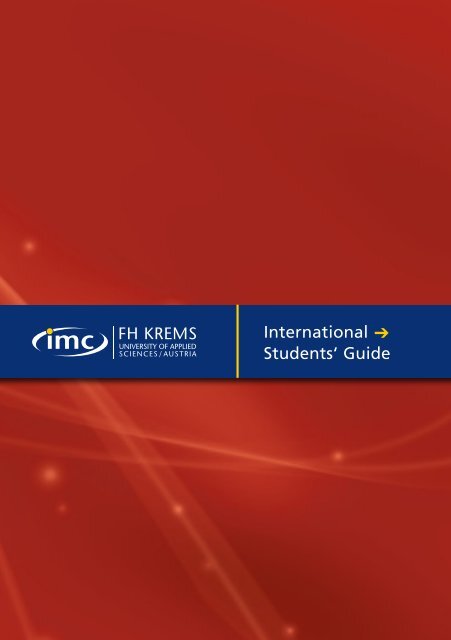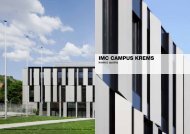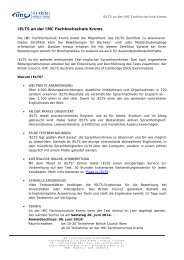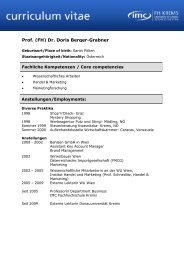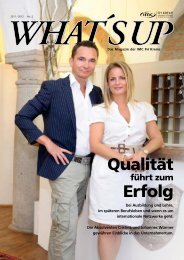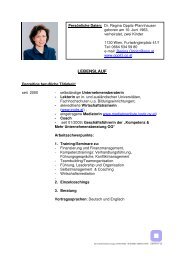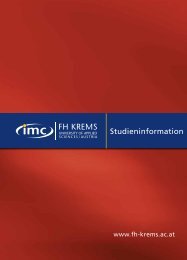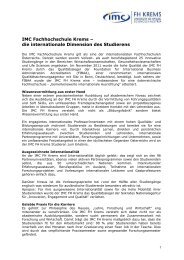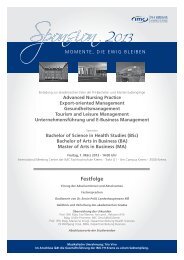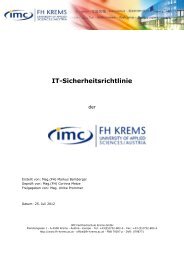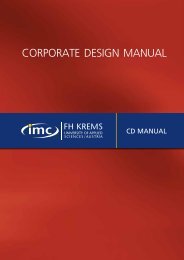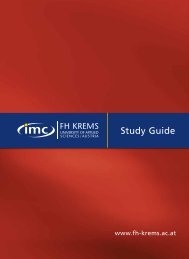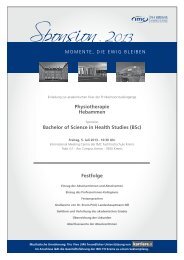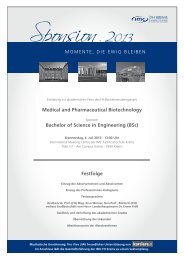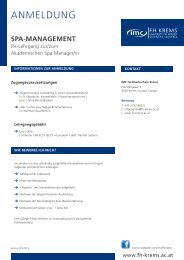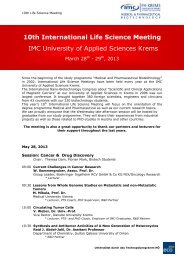International Students' Guide - IMC Fachhochschule Krems
International Students' Guide - IMC Fachhochschule Krems
International Students' Guide - IMC Fachhochschule Krems
You also want an ePaper? Increase the reach of your titles
YUMPU automatically turns print PDFs into web optimized ePapers that Google loves.
<strong>International</strong> ➔<br />
Students‘ <strong>Guide</strong>
FHR-5-0007_Vers.04_Rev.00_August 2012 2
WELCOME to the<br />
<strong>IMC</strong> UNIVERSITY OF APPLIED SCIENCES<br />
To study means …<br />
to develop your talents and strengths,<br />
to question things,<br />
to reflect on impressions and learning,<br />
to find your way to your personal<br />
success, and last of all,<br />
to stay curious your entire life.<br />
Dear Partners,<br />
Dear Students,<br />
The present “<strong>International</strong> Students’ <strong>Guide</strong>” contains, in a concise form, the most important information<br />
necessary in order to plan and prepare a study abroad period at the <strong>IMC</strong> University of Applied Sciences,<br />
<strong>Krems</strong>, Austria. It is intended to be a means of advice and assistance offering general as well as academic<br />
information. Please note that it should be complemented by the information given at the <strong>IMC</strong> website –<br />
www.fh-krems.ac.at and the <strong>International</strong> Students’ Course <strong>Guide</strong><br />
(download from the website www.fh-krems.ac.at/en/international).<br />
In case that some of your questions remain unanswered, it will be our pleasure to help you and answer<br />
your queries – by email, telephone or fax.<br />
We are looking forward to welcoming you and your students to the <strong>IMC</strong> University of Applied Sciences<br />
<strong>Krems</strong>.<br />
Prof.(FH) Mag. Eva Werner<br />
Rector<br />
FHR-5-0007_Vers.04_Rev.00_August 2012 3
TABLE OF CONTENTS<br />
1. GENERAL INFORMATION ..............................................................................................8<br />
1.1. Name and Address of the Institution ............................................................................................8<br />
1.2. Academic Mobility Programmes Office ........................................................................................8<br />
1.3. Academic Calendar .....................................................................................................................9<br />
1.4. Application & Admission ..............................................................................................................9<br />
2. THE <strong>IMC</strong> UNIVERSITY OF APPLIED SCIENCES KREMS ........................10<br />
2.1. Programme Structures ................................................................................................................10<br />
2.2. The Austrian Higher Education System ......................................................................................11<br />
2.3. Why study in Austria ..................................................................................................................12<br />
2.4. Why study at the <strong>IMC</strong> ................................................................................................................12<br />
3. THE DEGREE PROGRAMMES ...................................................................................13<br />
3.1. Export-Oriented management....................................................................................................13<br />
3.2. Tourism & Leisure Management .................................................................................................13<br />
3.3. Health Management ..................................................................................................................13<br />
3.4. Business Administration & E-Business Management .................................................................13<br />
3.5. Management ..............................................................................................................................14<br />
3.6. Marketing & Sales ......................................................................................................................14<br />
3.7. Management of Health Institutions ............................................................................................14<br />
3.8. Management of SME .................................................................................................................14<br />
3.9. Medical & Pharmaceutical Biotechnology ..................................................................................14<br />
3.10. Regulatory Affairs .....................................................................................................................14<br />
3.11. General Nursing ........................................................................................................................15<br />
3.12. Midwifery..................................................................................................................................15<br />
3.13. Environmental and Sustainability Management .......................................................................15<br />
3.14. Physiotherapy ............................................................................................................................15<br />
3.15. Advanced Nursing Practice .......................................................................................................15<br />
3.16. Music Therapy ..........................................................................................................................15<br />
3.17. Occupational Therapy ...............................................................................................................16<br />
FHR-5-0007_Vers.04_Rev.00_August 2012 4
4. <strong>IMC</strong> PREMISES & INFRASTRUCTURE .................................................................16<br />
4.1. <strong>International</strong> Campus „Piaristengasse“ ......................................................................................16<br />
4.2. Campus <strong>Krems</strong> ...........................................................................................................................17<br />
5. STUDYING AT THE <strong>IMC</strong> KREMS .............................................................................18<br />
5.1. Studying as a regular degree seeking student ............................................................................18<br />
5.2. Studying as Exchange Student ...................................................................................................19<br />
5.3. Buddy Network System ..............................................................................................................23<br />
6. KREMS – A PLEASANT PLACE FOR STUDY TIMES .................................23<br />
7. APPLICATION INFORMATION FOR EXCHANGE STUDENTS ..........25<br />
8. ARRIVAL INFORMATION .............................................................................................27<br />
8.1. Austria – Basic Facts ....................................................................................................................27<br />
8.2. The Province of Lower Austria ....................................................................................................27<br />
8.3. Entry and Visa Formalities / Residence Permits ...........................................................................28<br />
8.4. Health Care & Medical Insurance ...............................................................................................29<br />
8.5. Money ........................................................................................................................................30<br />
8.6. Food / Costs of Living .................................................................................................................31<br />
8.7. Post Office ..................................................................................................................................31<br />
8.8. Public Transportation .................................................................................................................32<br />
8.9. Telephone ...................................................................................................................................32<br />
8.10. Motorway Tolls .........................................................................................................................32<br />
8.11. Students´ Union .........................................................................................................................33<br />
8.12. Useful Sites and Addresses .......................................................................................................33<br />
8.13. How to reach <strong>Krems</strong> .................................................................................................................33<br />
FHR-5-0007_Vers.04_Rev.00_August 2012 5
THE INTERNATIONAL DIMENSION OF STUDYING<br />
The <strong>IMC</strong> University of Applied Sciences <strong>Krems</strong> is a partner in the ERASMUS network and holds the<br />
European University Charta 2007 (EUC) thus committing itself to respect the requirements of the<br />
European Commission, and to enhance the European and international dimension of studying.<br />
European Policy Statement (EPS)<br />
In its mission the <strong>IMC</strong> University of Applied Sciences states that it aspires to rank among the leading<br />
European Higher Education institutions and that internationalisation, excellence of education and quality<br />
assurance are among its key features in order to ensure employability of its graduates; cultural awareness,<br />
mutual respect and respect of diversity, social responsibility and fairness are its core values; the strong<br />
commitment of the institution to mobility fosters mutual understanding as well as sustainable social and<br />
economic coherence without boundaries.<br />
<strong>International</strong>isation is based on a European and trans-European network of academic and business<br />
partners for students and staff; the strategic goals for the further development of this network are a<br />
balanced spread of partners in all European countries, enhancement of knowledge transfer through<br />
regular mobility of staff and students between partner institutions (academic and business), the<br />
continued use of new media to support physical and virtual mobility and enhancement of diversity<br />
particularly through a focus on language learning (large range of languages offered).<br />
The intensified cooperation with partners through the design of double and joint degrees at Bachelor’s<br />
and Master’s levels will contribute to the further development of teaching and learning methods, create<br />
synergies, enlarge and deepen graduates’ competences. The two-cycle structure allows student mobility<br />
at both levels. Due to its practice-oriented programmes with a clear international focus, the institution<br />
will continue to give priority to all measures enhancing incoming and outgoing mobility (e.g. languages,<br />
training in intercultural competence), transparency of acquired skills and competences (EUROPASS,<br />
Diploma Supplement), acceptance of students and graduates by the labour market, access to further<br />
studies and quality assurance. The <strong>IMC</strong> University of Applied Sciences will continue to cooperate within<br />
multilateral network projects for the enhancement of certified skills and competences and take an active<br />
part in the continued dissemination of the results to internal and external stakeholders.<br />
Responsibility for ERASMUS activities and their dissemination is rooted at institutional level; both EUC<br />
and EPS will be made visible to students and staff through internal communication channels (intranet,<br />
student and staff conferences), to network partners and external stakeholders through the internet<br />
(homepage) and public and media relations. The <strong>IMC</strong> University of Applied Sciences is firmly committed<br />
to support disabled students and staff through technical infrastructure and personal counselling<br />
measures; gender equality is a guiding principle of the institutional policy; by its pronounced international<br />
focus of education the <strong>IMC</strong> University of Applied Sciences actively combats xenophobia and racism.<br />
The <strong>IMC</strong> University of Applied Sciences is ISO certified and thus procedures for mobility activities are<br />
implemented in the internal Quality Management system. For outgoing students provision of information<br />
implies access to information on partner institutions, their programmes, curricula and requirements,<br />
FHR-5-0007_Vers.04_Rev.00_August 2012 6
experience reports of senior students, all available on the intranet, and counselling during the application<br />
period through info sessions and personal coaching. ERASMUS students act as first-hand information<br />
brokers. Students are supported when setting up their study plans and learning agreements so that<br />
best fit their levels of learning and competences, programme requirements and expected outcomes and<br />
also take into account the culture of the host country. As languages play a key role in all programmes,<br />
students are linguistically well prepared. Recognition of successfully completed studies abroad on the<br />
basis of ECTS is guaranteed.<br />
For incoming students general information and course descriptions are provided in Students’ <strong>Guide</strong>s<br />
and by the staff of the <strong>International</strong> Office. Accommodation Service is given to all incoming students<br />
and special Welcome Days serve as icebreakers upon arrival. The Buddy-system with <strong>IMC</strong> students as<br />
personal tutors to incoming students is a fundamental principle for the integration of incoming students;<br />
tandem language learning helps to promote language competences and cultural understanding. In<br />
addition, a course on Austrian Culture and European Diversity is offered in line with German courses at<br />
four different levels. ECTS is applied for all incoming students. Staff mobility is organised and supported<br />
according to the same quality rules as student mobility; teaching mobility is considered enhancement of<br />
didactic and intercultural competences, an opportunity for critical reflection and exchange of knowledge<br />
and is thus strongly supported through time allowance, funds and acknowledgement.<br />
Placements (internships) are integral parts of all <strong>IMC</strong> curricula, they have to comply with the specific<br />
programme focus and serve as a bridge to the future field of work. The institution provides preparatory<br />
sessions in cooperation with professional recruiters dealing with CV and application design, forms of<br />
interviews, conflict management and personality training. Each programme has a full-time coordinator<br />
to support students in finding placements in accordance with the programme and individual needs,<br />
help with logistic and legal procedures and coach and monitor students during their period of work.<br />
An institutional database provides information on countries, companies and experiences of former<br />
trainees. Quality requirements for placement partners include a targeted “tri-lateral” match of student,<br />
programme and company, a mentoring and monitoring system including a feedback scheme within the<br />
company, access to infrastructure and industry specific know-how.<br />
Job descriptions, working hours, duration of placement, expected learning outcomes, guidance through<br />
the company and services offered are set out in the placement contract signed by the student, the host<br />
institution, the university and in some cases the intermediary organisation. All rights and duties of parties<br />
involved are agreed upon in this contract.<br />
Placements are learning periods, therefore critical reflection on theory learned and implementation of<br />
acquired skills and competences are guiding principles. Monitoring is done in regular intervals to assure<br />
a smooth running, students are in contact with the <strong>IMC</strong> coordinator via email and telephone. Evaluation<br />
of placements by the sending institution is based on students’ reports, presentations and work-related<br />
problem analyses, and complemented by job performance evaluation by the host organisation and<br />
placement supervisor. Placements are recognised as full academic study periods in terms of ECTS by the<br />
university.<br />
FHR-5-0007_Vers.04_Rev.00_August 2012 7
1. General Information<br />
1.1. Name and Address of the Institution<br />
<strong>IMC</strong> <strong>Fachhochschule</strong> <strong>Krems</strong> / <strong>IMC</strong> University of Applied Sciences <strong>Krems</strong><br />
Campus <strong>Krems</strong><br />
Am Campus, building G, 3500 <strong>Krems</strong>, Austria / Europe<br />
and<br />
<strong>International</strong> Campus “Piaristengasse”<br />
Piaristengasse 1, 3500 <strong>Krems</strong>, Austria / Europe<br />
phone: +43 (0)2732/802<br />
fax: +43 (0)2732/802-4<br />
email: office@fh-krems.ac.at<br />
www.fh-krems.ac.at<br />
Erasmus ID: A KREMS 03<br />
EUC: 29732-IC-1-2007-1-AT-ERASMUS-EUCX-1<br />
Executive Managers:<br />
Dr. h.c. Dkfm. Mag. Heinz Michael BOYER<br />
Mag. Ulrike PROMMER<br />
Office: Campus <strong>Krems</strong><br />
Rectorate:<br />
Prof.(FH) Mag. Eva WERNER (Rector)<br />
Prof.(FH) Dr. Karl ENNSFELLNER (Vice-Rector)<br />
Office: Campus <strong>Krems</strong><br />
1.2. Academic Mobility Programmes Office<br />
Campus <strong>Krems</strong>, (building G), 3 rd floor, room 3.07<br />
Head of Department<br />
Prof.(FH) Dr. Maximilian SCHACHNER<br />
phone: +43 (0)2732/802-150<br />
fax: +43 (0)2732/802-318<br />
email: max.schachner@fh-krems.ac.at<br />
Coordinator Academic Mobility Programmes (Outgoing students & Events)<br />
Regina PARZER<br />
phone: +43 (0)2732/802-511<br />
fax: +43 (0)2732/802-318<br />
email: regina.parzer@fh-krems.ac.at or international@fh-krems.ac.at<br />
FHR-5-0007_Vers.04_Rev.00_August 2012 8
Coordinator Academic Mobility Programmes (Incoming students & Accommodation)<br />
Sylvia SCHNELZER<br />
phone: +43 (0)2732/802-270<br />
fax: +43 (0)2732/802-318<br />
email: sylvia.schnelzer@fh-krems.ac.at or international@fh-krems.ac.at<br />
ECTS & Bologna Institutional Coordinator: Prof.(FH) Mag. Eva WERNER<br />
phone: +43 (0)2732/802-250<br />
fax: +43 (0)2732/802-318<br />
email: eva.werner@fh-krems.ac.at or international@fh-krems.ac.at<br />
1.3. Academic Calendar<br />
For details of terms, please refer to the information given on our website under<br />
www.fh-krems.ac.at/en/international.<br />
No lectures will be held on the following Austrian Public Holidays: 26.10. (National Holiday); 01.11.<br />
(All Saints’ Day); 08.12.; 01.01. (New Year’s Day), 06.01., Easter Monday (movable); 01.05. (Labour Day);<br />
Ascension Day (movable), Whit Monday, Corpus Christi Day (movable);<br />
1.4. Application & Admission<br />
Please download the application forms for incoming exchange students from our website.<br />
Application Deadlines for Exchange Students:<br />
May 1st (Fall term)<br />
November 1st (Spring term)<br />
As to application and admission requirements for degree seeking students, please refer to 5.1 and<br />
www.fh-krems.ac.at/en/apply/.<br />
FHR-5-0007_Vers.04_Rev.00_August 2012 9
2. THE <strong>IMC</strong> UNIVERSITY OF APPLIED SCIENCES KREMS<br />
The <strong>IMC</strong> University of Applied Sciences <strong>Krems</strong> was founded in 1994, the same year, when the first<br />
so-called “Fachhochschul-Studiengang” (degree programme) was established in Austria following the<br />
Federal Act on Fachhochschul programmes. These study programmes are proposed and run by corporate<br />
bodies of public and/or private law like the <strong>IMC</strong> <strong>Fachhochschule</strong> <strong>Krems</strong> GmbH. The programmes have<br />
to be approved and accredited by an independent council, the “Fachhochschulrat” whose members<br />
are appointed by the Austrian Ministry of Science. All programmes are subject to a strict process<br />
of accreditation, evaluation and re-accreditation at fixed intervals. Thus, quality control and quality<br />
assurance have become major elements of all programmes.<br />
The programmes offered at Universities of Applied Sciences differ from traditional university programmes<br />
in that they are more vocationally oriented and include practical professional training terms as integral<br />
parts of the curriculum. The intake of students per study programme and year is limited, therefore an<br />
admission procedure is required. All programmes are designed in close cooperation with experts from<br />
the industry or public sector thus responding directly to the needs of the job market. Furthermore,<br />
emphasis is equally put on the development of personal competencies and soft skills as well as on<br />
innovative teaching methods.<br />
2.1. Programme Structures<br />
STRUCTURE<br />
X X Bachelor programme<br />
Entrance requirements: Austrian school<br />
leaving exam or foreign equivalent.<br />
180 ECTS / 6 semesters<br />
1 practical training semester (semester 4 or 5)<br />
2 Bachelor dissertations<br />
Bachelor exam (oral)<br />
In all programmes, the European Credit Transfer System (ECTS) is applied. Furthermore, upon graduation<br />
from any programme every student receives – free of charge – the Diploma Supplement which is<br />
designed to ensure transparency and comparability of studies and degrees (you can find a sample<br />
Diploma Supplement for each progarmme at www.fh-krems.ac.at > choose the adequate degree<br />
programme).<br />
STRUCTURE<br />
X X Master programme<br />
Entrance requirements: subject specific<br />
Bachelor degree or equivalent.<br />
120 ECTS / 4 semesters<br />
Research semester (can be done abroad);<br />
Master thesis and exam<br />
The new Bologna structure shall not only help to implement a common European Higher Education Area,<br />
but will also ease the way to students’ mobility and international recognition of studies and degrees.<br />
FHR-5-0007_Vers.04_Rev.00_August 2012 10
The three pillars of Bologna - 2-cycle system, ECTS and Diploma Supplement have been successfully<br />
implemented at the <strong>IMC</strong> University of Applied Sciences <strong>Krems</strong>.<br />
In 2004, the <strong>IMC</strong> University of Applied Sciences <strong>Krems</strong> was awarded the Quality Label of the Austrian<br />
Erasmus National Agency; since June 2006, the <strong>IMC</strong> has been holder of the Diploma Supplement<br />
Label.<br />
2.2. The Austrian Higher Education System<br />
Like most of the European countries, Austria has implemented the “Bologna system” which means<br />
that nearly all Higher Education Institutions will switch or already have switched from the four-year long<br />
programmes, which could immediately be followed by doctoral studies, to the three-cycle system of<br />
Bachelor, Master and Doctorate (or PhD).<br />
For a student, this Bologna system opens up various options as shown below:<br />
3 rd cycle: Dr., PhD Job market<br />
As the bachelor degree is a first fully qualifying degree, direct entrance to the job market is an option<br />
for those who want to acquire some years of work experience first and then continue their education<br />
at a later stage. Programmes offered at the University of Applied Sciences <strong>Krems</strong> are generally more<br />
vocationally oriented and are always conceived and developed in close cooperation with the relevant<br />
industry, thus following the principle of employability. For further information on the Austrian Higher<br />
Education System, please see www.bmwf.gv.at.<br />
2 nd cycle: MASTER: MA, MSc, LL.M<br />
2 years<br />
1 st cycle: BACHELOR : BA, BSc, LL.B<br />
3 years<br />
University entrance:<br />
Secondary General /Technical schooling<br />
FHR-5-0007_Vers.04_Rev.00_August 2012 11
2.3. Why study in Austria<br />
There are lots of reasons for studying in Austria, some of them are listed hereafter:<br />
A guarantee for cutting-edge education<br />
U nique landscape<br />
S afe country<br />
T radition and culture<br />
R ich in history<br />
I deal ambiance for an excellent study experience<br />
A ffectionate people<br />
More information on studying in Austria is provided by the ÖAD (Austrian Exchange Service - Agency for<br />
<strong>International</strong> Cooperation in Education and Research, www.oead.at)<br />
Scholarships:<br />
The <strong>IMC</strong> University of Applied Sciences <strong>Krems</strong> does not offer scholarships but operates within the<br />
ERASMUS network. Students from non-European countries and partner institutions can apply for the<br />
Ernst Mach Scholarship. For details please see www.grants.at.<br />
2.4. Why study at the <strong>IMC</strong><br />
The <strong>IMC</strong> Mission Statement is:<br />
“We are an Austrian university with international focus. We offer practice-oriented degree<br />
programmes according to the needs of the industry. Our programmes fulfil international<br />
university standards, thereby ensuring that our students are fully qualified to assume positions<br />
of responsibility in business and society.<br />
Our graduates and partners are a constant and integral part of the further development of<br />
the university, thereby making a joint contribution to the rising quality of our teaching and<br />
research.”<br />
Thus, programmes at <strong>IMC</strong> University of Applied Sciences <strong>Krems</strong> stand for:<br />
<strong>International</strong>ity as they provide the possibilities to work and study abroad, and exchange<br />
experiences with international fellow students;<br />
Managerial skills as they focus on management and soft skills;<br />
Community and Communication building on an excellent<br />
relationship between students and teaching staff.<br />
FHR-5-0007_Vers.04_Rev.00_August 2012 12
K aleidoscope of unforgettable memories<br />
R ight balance between theory and practice<br />
E xcellent lecturers from science and business<br />
M odern infrascructure<br />
S tudents from all over the world<br />
3. THE DEGREE PROGRAMMES<br />
Like most of the European Higher Education institutions, the <strong>IMC</strong> University of Applied Sciences<br />
<strong>Krems</strong> follows the Bologna system and thus offers 3-year Bachelor’s and 2-year Master’s programmes.<br />
Bachelor’s programmes comprise 180 ECTS, with one practical training semester as integral part;<br />
Master’s programmes comprise 120 ECTS.<br />
3.1. Export-Oriented Management<br />
Bachelor: 6 semesters, 180 ECTS, full-time; Bachelor of Arts in Business, B.A.<br />
Master: 4 semesters, 120 ECTS, full-time & part-time; Master of Arts in Business, M.A.<br />
Language of instruction: English<br />
Located at: <strong>International</strong> Campus “Piaristengasse”<br />
3.2. Tourism & Leisure Management<br />
Bachelor: 6 semesters, 180 ECTS, full-time & part-time; Bachelor of Arts in Business, B.A.<br />
Master: 4 semesters, 120 ECTS, full-time; Master of Arts in Business, M.A.<br />
Language of instruction: English<br />
Located at: <strong>International</strong> Campus “Piaristengasse”<br />
3.3. Health Management<br />
Bachelor: 6 semesters, 180 ECTS, full-time and part-time; Bachelor of Arts in Business, B.A.<br />
Language of instruction: German, partly English<br />
Located at: Campus <strong>Krems</strong><br />
3.4. Business Administration & E-Business Management<br />
Bachelor: 6 semesters, 180 ECTS, full-time and part-time; Bachelor of Arts in Business, B.A.<br />
Language of instruction: German, partly English<br />
Located at: Campus <strong>Krems</strong><br />
FHR-5-0007_Vers.04_Rev.00_August 2012 13
3.5. Management<br />
Master: 4 semesters, 120 ECTS, full-time; Master of Arts in Business, M.A.<br />
Language of instruction: German, partly English<br />
Located at: Campus <strong>Krems</strong><br />
3.6. Marketing & Sales<br />
Master: 4 semesters, 120 ECTS, full-time; Master of Arts in Business, M.A.<br />
Language of instruction: English<br />
Located at: Campus <strong>Krems</strong><br />
3.7. Management of Health Institutions<br />
Master: 4 semesters, 120 ECTS, part-time; Master of Arts in Business, M.A.<br />
Language of instruction: German, partly English<br />
Located at: Campus <strong>Krems</strong><br />
3.8. Management of SME<br />
Master: 4 semesters, 120 ECTS, part-time; Master of Arts in Business, M.A.<br />
Language of instruction: German, partly English<br />
Located at: Campus <strong>Krems</strong><br />
3.9. Medical & Pharmaceutical Biotechnology<br />
Bachelor: 6 semesters, 180 ECTS, full-time; Bachelor of Science in Engineering, BSc<br />
Master: 4 semesters, 120 ECTS, full-time; Master of Science in Engineering, MSc<br />
Language of instruction: English<br />
Located at: Campus <strong>Krems</strong><br />
3.10. Regulatory Affairs<br />
Master: 4 semesters 120 ECTS, part-time; Master of Science in Natural Sciences, MSc<br />
Language of instruction: English<br />
Located at: Campus <strong>Krems</strong><br />
FHR-5-0007_Vers.04_Rev.00_August 2012 14
3.11. General Nursing<br />
Bachelor: 6 semesters, 180 ECTS, full-time; Bachelor of Science in Health Studies, BSc<br />
Language of instruction: German<br />
Located at: Campus <strong>Krems</strong><br />
3.12. Midwifery<br />
Bachelor: 6 semesters, 180 ECTS, full-time; Bachelor of Science in Health Studies, BSc<br />
Language of instruction: German<br />
Located at: Campus <strong>Krems</strong><br />
3.13. Environmental and Sustainability Management<br />
Master: 4 semesters, 120 ECTS, full-time; Master of Arts in Business, M.A.<br />
Language of instruction: German<br />
Located at: Campus <strong>Krems</strong><br />
3.14. Physiotherapy<br />
Bachelor: 6 semesters, 180 ECTS, full-time; Bachelor of Science in Health Studies, BSc<br />
Language of instruction: German<br />
Located at: Campus <strong>Krems</strong><br />
3.15. Advanced Nursing Practice<br />
Bachelor: 6 semesters, 180 ECTS, part-time; Bachelor of Science in Health Studies, BSc<br />
Language of instruction: German<br />
Located at: Campus <strong>Krems</strong><br />
3.16. Music Therapy<br />
Bachelor: 6 semesters, 180 ECTS, part-time; Bachelor of Science in Health Studies, BSc<br />
Master: 4 semesters, 120 ECTS, part-time; Master of Science in Health Studies, MSc<br />
Language of instruction: German<br />
Located at: Campus <strong>Krems</strong><br />
FHR-5-0007_Vers.04_Rev.00_August 2012 15
3.17. Occupational Therapy<br />
Bachelor: 6 semesters, 180 ECTS, full-time; Bachelor of Science in Health Studies, BSc<br />
Language of instruction: German<br />
Located at: Campus <strong>Krems</strong><br />
Please find the detailed course structure diagrams and curricula on our website<br />
www.fh-krems.ac.at/en/studying.<br />
4. <strong>IMC</strong> PREMISES & INFRASTRUCTURE<br />
In August 2005, the <strong>IMC</strong> University of Applied Sciences <strong>Krems</strong> opened the new Campus <strong>Krems</strong> yet with<br />
the programmes Tourism & Leisure Management and Export-Oriented Management still being housed<br />
at the premises of the <strong>IMC</strong> <strong>International</strong> Campus “Piaristengasse”, in the former Cloister of the Piarists,<br />
right in the center of the medieval city.<br />
4.1. <strong>International</strong> Campus „Piaristengasse“<br />
The former cloister has been converted into a facility that meets all the demands of a modern<br />
educational establishment, especially in the area of New Media and Telecommunications. The contrast<br />
between the historical ambience and state-of-the-art technology creates a particularly interesting flair.<br />
The university is situated right in the centre of the old city of <strong>Krems</strong>, at the heart of which is a pulsating<br />
pedestrian zone with a multitude of shopping possibilities, restaurants and cafes that are very popular<br />
meeting places for the students. There are also attractive residential possibilities in the inner city, very<br />
close to the university.<br />
The following facilities can be found at ”Piaristengasse”:<br />
Administration Offices of Export- and Tourism-Programmes<br />
The administration offices of the degree programmes “Tourism and Leisure Management” and “Export-<br />
oriented Management” are located on the second floor.<br />
Cafeteria<br />
The cafeteria, located on the ground floor, is open daily from 8:00 to 16:00 hrs, offering cold and warm<br />
drinks, snacks as well as warm dishes.<br />
Computer Labs<br />
The <strong>IMC</strong> has several computer labs both in the Piaristengasse as well as at the Campus <strong>Krems</strong> which are<br />
open to students from Monday to Friday (labs at the Campus <strong>Krems</strong> are open on Saturdays, too); printers<br />
are equally at the students’ disposal.<br />
FHR-5-0007_Vers.04_Rev.00_August 2012 16
The computer labs are equipped with scanner, CD burner and video beamers. Furthermore, students<br />
have access to external LAN plug-ins in the corridors. All students receive an <strong>IMC</strong> email account and their<br />
personal email address once they are registered at the <strong>IMC</strong>. The email address that students will have<br />
once they are registered at the <strong>IMC</strong>-<strong>Krems</strong> is:<br />
IDnumber@fh-krems.ac.at<br />
Copying Machines<br />
Several copying machines are at the students’ disposal. The students’ ID cards can be loaded as copy cards.<br />
Courtyard<br />
The Piaristengasse courtyard is a pleasant place to relax during the breaks and is open to all students.<br />
Info Screens<br />
Info Screens showing the courses of the programmes of each day and the relevant rooms are located<br />
outside the cafeteria on the ground floor, as well as on the 1 st and 2 nd floors.<br />
Reading Room for Students<br />
A small reading room can be found at the <strong>International</strong> Campus Piaristengasse on the second floor. In<br />
this room Austrian and international newspapers and magazines can be found. Free access is given to<br />
students and lecturers during the daily opening hours. All <strong>IMC</strong> students have access to the big library<br />
on the Campus <strong>Krems</strong> where a multitude of national and international books, online magazines as well<br />
as course literature can be found. Books can be borrowed for two weeks. Books that are required in the<br />
study programmes can be lent for the entire semester upon availability.<br />
Seminar Rooms<br />
Every seminar room is equipped with a computer, overhead projector, flip chart, bulletin board, white<br />
board and/or black board, and beamer. Please note that eating is forbidden in the seminar rooms.<br />
4.2. Campus <strong>Krems</strong><br />
There is a special spirit inside the walls of this former tobacco factory, a building that was converted<br />
into an internationally acclaimed university facility. This spirit is one of knowledge and openness, and it<br />
is here that students can also enjoy the benefits of the most modern infrastructure. The facilities at the<br />
European Centre for Education – Campus <strong>Krems</strong> will be continually expanded in the coming years to<br />
position the city of <strong>Krems</strong> as Lower Austria’s internationally recognised university city – are manifold:<br />
<strong>IMC</strong> students find all the necessary equipment and facilities, such as computer labs, printers, copying<br />
machines, cafeteria, student restaurant, library, students’ residence, as well as sport facilities and a movie<br />
centre/theatre at the Campus <strong>Krems</strong>.<br />
The Campus <strong>Krems</strong> also houses the executive management of the <strong>IMC</strong>, all general administration offices as<br />
well as all degree programmes except “Tourism & Leisure Management” and “Export-oriented Management”.<br />
The Academic Mobility Programmes Office is located on the 3 rd floor of the building G, office 3.07.<br />
FHR-5-0007_Vers.04_Rev.00_August 2012 17
5. STUDYING AT THE <strong>IMC</strong> KREMS<br />
5.1. Studying as a regular degree seeking student<br />
Admission and entrance requirements for regular degree seeking students<br />
Admission to Bachelor programmes requires an Austrian School Leaving Certificate or<br />
international equivalent and an admission procedure.<br />
Admission to Master programmes requires a subject specific Bachelor degree or equivalent and<br />
an admission procedure.<br />
For details please see www.fh-krems.ac.at/en/apply/<br />
Study information for regular degree seeking students<br />
Regular degree seeking students must strictly follow the study plan, including two Bachelor dissertations<br />
and an oral Bachelor exam for Bachelor students; a Master thesis plus oral Master exam for Master<br />
students.<br />
Courses are given in the form of lectures, seminars or workshops, and various teaching methods are<br />
being used, such as project-based learning, e-learning, traditional lectures etc. Besides attending the<br />
courses – attendance is mandatory - students have to do a considerable amount of self-study and project<br />
work. Special emphasis is put on practice-oriented learning.<br />
National Grading Scale<br />
Grade Definition<br />
1 Excellent / Very Good<br />
2 Good<br />
3 Satisfactory<br />
4 Sufficient<br />
5 Fail<br />
p Pass<br />
acc Accredited upon studies abroad<br />
apl Accredited upon previous learning<br />
Students must receive at least a “4” (sufficient), in order to pass a course.<br />
FHR-5-0007_Vers.04_Rev.00_August 2012 18
5.2. Studying as Exchange Student<br />
Admission as an Exchange Student<br />
Is based on bilateral agreements with the <strong>IMC</strong> partner institution. For details and requested documents<br />
please see www.fh-krems.ac.at/en/international<br />
Study information for Exchange Students<br />
<strong>International</strong> exchange students can select courses from all programmes and can compose their<br />
individual study plans. However, places in courses are limited, thus selecting course alternatives should<br />
always be taken into consideration.<br />
Grading Scale used for Exchange Students<br />
Grade<br />
% of overall<br />
course<br />
performance<br />
Definition<br />
A/1 100 – 91% Very Good / Excellent - Performance with only minor errors<br />
B/2 90 – 81% Good – Above average but with errors<br />
C/3 80 – 71% Satisfactory – Generally sound work with a number of notable errors<br />
D/4 70 – 60% Sufficient – But with significant shortcomings<br />
F/5 Less than 60% Fail – Further work is required<br />
Attendance<br />
Attendance of all courses in which a student is enrolled is mandatory. Students can miss 3 times the<br />
weekly amount of hours indicated in the study programme. Block seminars must be attended 100%.<br />
A course is considered a block seminar when it has more than four hours on one day. This means that<br />
if a course is taught two hours per week students are allowed to miss 3 x 2 = 6 hours in total for that<br />
particular course. If a student misses more than the total hours allowed for a particular course, then he/<br />
she fails the course and does not receive ECTS credits. Once a student is registered in a course he/she<br />
must inform in writing the Academic Mobility Programmes Office if a course shall be deleted from his/<br />
her study plan. Some courses are not graded, but students receive their ECTS credits upon completion<br />
(pass).<br />
Books and Course Material<br />
Books and scripts, needed during the stay, should be purchased by the students. According to availability,<br />
certain books can be borrowed from the library for the period of the student’s stay or copies of the<br />
relevant chapters can be made.<br />
Buddies<br />
<strong>IMC</strong> regular students will act as buddies for international students thus helping with daily academic or<br />
other matters. <strong>International</strong> students will meet their buddy during a “Meet & Greet Reception” at the<br />
beginning of the term.<br />
FHR-5-0007_Vers.04_Rev.00_August 2012 19
Certificate of Attendance<br />
A certificate of attendance will be issued at the end of an international student’s stay at the <strong>IMC</strong><br />
University of Applied Sciences <strong>Krems</strong>.<br />
Course Selection<br />
<strong>International</strong> students may compose their own study plan choosing the courses most appropriate to<br />
their studies and according to the requirements of their home institution. However, as the courses<br />
of the different semesters are run on a parallel basis, schedule clashes may occur if a student selects<br />
courses from different semesters and programmes. It is therefore recommended to choose the majority<br />
of courses from one and the same semester. In case of group divisions, students can choose the group<br />
most appropriate to their schedule as long as places are available. Please note that due to pedagogic and<br />
quality reasons, some courses allow limited access only.<br />
The selected group (1/2/3) must in any case be indicated together with the course code on the learning<br />
agreement and on the enrolment form. As a general rule, students may choose courses from<br />
different programmes if suitable. Overlapping courses must be avoided as they would make compulsory<br />
attendance in all chosen courses impossible. We also highly recommend choosing courses from the<br />
German programmes if a student has a sufficient knowledge of German.<br />
ECTS Credits<br />
The European Credit Transfer System (ECTS) is used in order to measure a student’s workload in a<br />
particular course. The number of ECTS credits attributed to a course reflects not only the contact hours<br />
in class but all study work (preparation, assignments, projects, exams etc) related to a course. The normal<br />
workload per semester is 30 ECTS.<br />
<strong>International</strong> students should contact their national coordinator to know the number of ECTS credits<br />
they are required to achieve during their stay at the <strong>IMC</strong> <strong>Krems</strong>. In order to justify a semester, the <strong>IMC</strong><br />
strongly recommends to international students a minimum attendance of at least 5 regular courses<br />
(minimum 15 ECTS).<br />
ECTS Learning Agreement<br />
Each incoming international student has to present an ECTS learning agreement approved by his/her<br />
home institution. Changes to this agreement can only be made during the first two weeks of a term and<br />
must also be approved by the sending institution. Once registered for a course, attendance of this course<br />
becomes mandatory in order to receive a grade and ECTS credits.<br />
E-Desktop<br />
see also > Intranet / E-Desktop<br />
Exams<br />
Exams usually take place during and at the end of the term. Please note that no extra exam dates can<br />
be arranged. Students who miss the required exames or course work will not be graded nor receive ECTS<br />
credits.<br />
FHR-5-0007_Vers.04_Rev.00_August 2012 20
Intranet / E-Desktop<br />
With their user’s name (ID number@fh-krems.ac.at) and their personal password, students get access to<br />
the Intranet/E-Desktop of the <strong>IMC</strong> <strong>Krems</strong>. All relevant information (such as news, schedules, grade lists,<br />
specific course information, course syllabi and learning material) can be found on the Intranet. Students<br />
registered in a particular course will get access to the specific platform of this course. Programme-<br />
relevant and updated information is published under the links of the individual programmes.<br />
German Courses<br />
German courses at several levels will be offered. A German test has to be taken during the Induction<br />
Week in order to be assigned to the best suited level.<br />
Grade Transcripts / Transcript of Records<br />
Students will receive a transcript of grades for their studies after the end of each term. The original grade<br />
report showing the number of hours per week, ECTS credits and grades will be sent to the students’<br />
home institution.<br />
ID card / ID number<br />
Every international student will receive an ID card and ID number once registered at the <strong>IMC</strong> <strong>Krems</strong>.<br />
This ID card has to be presented when going in for exams, allows access to the library and serves for<br />
borrowing books, it can also be used for copying and printing after having been loaded appropriately.<br />
ID numbers and the connected user’s name are strictly confidential information and must not be passed<br />
on to third parties. Before departure the receptionist at the Campus <strong>Krems</strong> can reimburse students with<br />
eventual credit amounts of the printer’s and copying machines.<br />
Information<br />
General information relating to the courses and the degree programmes will be posted on the E-Desktop<br />
platform. Information concerning specific matters for international students will be posted on E-Desktop/<br />
Academic Mobility Programmes Office. Programme relevant information, announcements, grade lists etc.<br />
can be found on the E-Desktop under the link of the individual programme.<br />
Induction Week<br />
The <strong>IMC</strong> University of Applied Sciences <strong>Krems</strong> organizes an “Induction Week” for international students.<br />
During these days, the incoming students are made familiar with the most important information, the<br />
rules and regulations of the university, the computer system and the e-learning platform. Furthermore,<br />
an excursion to the surroundings and a city tour of <strong>Krems</strong> are organized. Attendance of this Induction<br />
Week is mandatory.<br />
Language of Instruction<br />
In the programmes Export-Oriented Management, Tourism & Leisure Management, Marketing<br />
& Sales, Regulatory Affairs as well as Medical & Pharmaceutical Biotechnology, English is the<br />
exclusive language of instruction.<br />
The study programmes Business Administration, Health Management, Management of Health<br />
Institutions, Management, Management of SME, Midwifery, Physiotherapy, Advanced<br />
FHR-5-0007_Vers.04_Rev.00_August 2012 21
Nursing Practice, Occupational Therapy, General Nursing, Environmental and Sustainability<br />
Management and Music Therapy are taught in German.<br />
Please make sure that your level of language competence of the language of instruction is good enough<br />
to follow academic courses (the level of competence must be at least B2 on the scale of the European<br />
Framework of References – please also see the application form for evaluation).<br />
Laptops<br />
Students who bring their own laptops and want to have access to the <strong>IMC</strong> net (wireless LAN) must have<br />
them configurated to the <strong>IMC</strong> system. Instructions will be given during the induction week.<br />
Password and Intranet Access<br />
Three weeks prior to the beginning of a term, international exchange students will receive via email their<br />
password and access code for the <strong>IMC</strong> E-Desktop. From that time on, students can view their personal<br />
profile to which they must up-load a passport photo; they are equally requested to check their personal<br />
data and fill in their coordinator’s name.<br />
During this three weeks’ period, students can view all course syllabi and have access to the schedules so<br />
that they can already compose their final study plan and personal schedule prior to their arrival in <strong>Krems</strong>.<br />
Professional Dress and Phones<br />
Professional dress is an important aspect in any business setting in today’s world. There is no specific<br />
dress code, but <strong>IMC</strong> students are asked to dress in a professional manner. This means no shirts with<br />
offending / provocative texts, or baseball caps, etc. should be worn at the FH-<strong>Krems</strong>.<br />
Cell phones have to be switched off during the courses, in the computer labs and the library.<br />
Schedules<br />
The schedules of all programmes can be found on the <strong>IMC</strong> E-Desktop to which international students<br />
get access with their user’s name. As schedules may change due to unforeseen incidents it is strongly<br />
recommended to check them on a daily basis.<br />
Smoking<br />
As in all public buildings, smoking is forbidden on the <strong>IMC</strong> premises. There are, however, smoking<br />
corners outside the building.<br />
Sport Facilities<br />
The Campus <strong>Krems</strong> offers various sport facilities such as rowing, tennis, aerobic etc. Enrolment into the<br />
various sport courses can be done during the Induction Week at the office of “Campus Sport”<br />
(building L, first floor).<br />
Syllabus<br />
Each lecturer will put the syllabus of his/her course on the E-Desktop. The syllabus informs students<br />
about content, structure, teaching method, necessary and recommended literature as well as testing<br />
procedures of the individual courses. All syllabi will be on the E-Desktop by the beginning of the terms (<br />
FHR-5-0007_Vers.04_Rev.00_August 2012 22
Test Dates<br />
Test dates are usually indicated in the syllabus of a course, in the schedule and on the E-Desktop platform.<br />
Test dates must be respected as missed tests can normally not be repeated.<br />
5.3. Buddy Network System<br />
A buddy is a local student who has applied to be a part of the Buddy system. Being a buddy is voluntary,<br />
and buddies are not paid for their efforts. They are simply buddies because they are interested in helping<br />
you! In this mentor system, every incoming exchange student is assigned one full-time student as his/<br />
her personal “buddy”. There are two aims behind this: obviously to assist integration of the exchange<br />
student, but also to give the regular students the chance to socialise with international students.<br />
It is up to you to decide how much you want to make use of your buddy. In some cases, the esteblished<br />
friendship between exchange student and buddy does not only last during the entire stay in Austria but<br />
also long after, others mainly need or want a buddy during the initial time after arrival. Regardless of<br />
the length of time, your buddy is there to assist you with practical matters, answering questions about<br />
studying here or giving advice about life in <strong>Krems</strong> and Austria. A buddy may not be able to answer every<br />
single question you may have, but your buddy has lived in Austria for a while and is a student her/himself<br />
at the university and therefore knows a great deal about both the university and <strong>Krems</strong>.<br />
Tandem Language Learning<br />
We strongly encourage students to form Tandem learning teams in order to improve their language<br />
competences vice-versa.<br />
6. KREMS – A PLEASANT PLACE FOR STUDY TIMES<br />
<strong>Krems</strong> is located in Lower Austria, on the River Danube, about one hour from Vienna, the capital of<br />
Austria. <strong>Krems</strong>, with its 25.000 inhabitants, looks back on a more than 1000-year old history and is<br />
famous for its wine-growing industry. It is the “door” to the Wachau, one of Austria’s most well-known<br />
wine-growing areas, listed by UNESCO as a world cultural heritage site.<br />
<strong>Krems</strong> provides students with a rich choice of activities for mind, body and soul. It is the flair, as well<br />
as the cultural and leisure activities available in a chosen city of study that makes a major contribution<br />
to whether students feel comfortable, and how much they enjoy their student lives. It is possible to<br />
draw strength from an inspired atmosphere and from a wide range of leisure activities – and this is an<br />
important balance to periods of concentrated study.<br />
<strong>Krems</strong> on the Danube is one of Austria’s most charming cities and offers a picturesque landscape and<br />
is a host of historical and cultural treasures. The city features a rich, established contemporary art and<br />
cultural scene, which includes the “<strong>Krems</strong> Cultural Mile” with its Caricature and Literature Museum and<br />
FHR-5-0007_Vers.04_Rev.00_August 2012 23
the “Kunsthalle <strong>Krems</strong>” which houses interesting exhibitions.<br />
These museums, together with Lower Austria’s Danube Festival, the East-West Music Festival and the<br />
Wachau Film Festival, attract many thousands of visitors every year.<br />
On the one hand, <strong>Krems</strong> is romantic, informal and cosy, and on the other, it is innovative, international<br />
and very hospitable, providing wonderful contrasts that combine to create a particularly harmonious city.<br />
For further information please have a look at the website www.krems.gv.at.<br />
<strong>Krems</strong> Tourismus: www.tiscover.com/krems<br />
Donau Niederösterreich Tourismus: www.donau.com or www.wachau.at<br />
Leisure Activities<br />
<strong>Krems</strong> offers a variety of interesting leisure activities. The social company of colleagues and friends<br />
spent either in the bars and cafes of the old city, or in the nearby cosy, local historic wine inns, is just<br />
as important for students as the lively cultural scene and associated events. An even more important<br />
balancing element to studying is sport! The wonderful local countryside simply invites a number of<br />
outdoor activities – jogging, cycling, water sports, golf, etc. and that is why the Wachau Marathon has<br />
now developed into a sporting mega-event.<br />
Students and young people find almost everything to entertain themselves; such as a movie theatre that<br />
features films in English, a yacht harbor, an ice-skating rink, a few fitness centers with aerobics and other<br />
exercise classes, a racquetball club, a soccer club, tennis courts, a swimming arena with in- and outdoor<br />
pools, sauna, steam bath, a rock-climbing resort, and also an indoor wall climbing area, mini golf. A golf<br />
resort can be found close by. Besides this, students enjoy the walkway next to the Danube for skating,<br />
bike riding and jogging.<br />
Excursions<br />
<strong>Krems</strong> is situated at the “door” to the Wachau – Austria’s most important wine growing region and<br />
UNESCO world cultural heritage.<br />
Various places in the near surroundings are worth seeing: the Abbey of Göttweig, the baroque<br />
Monastery of Melk with its world-famous library, the picturesque city of Dürnstein, the wine-world of<br />
the LOISIUM, and many others.<br />
Vienna with its unique sites and museums is only a one-hour-train ride away, and on the way to Vienna,<br />
Tulln – the birthplace of Egon Schiele – also offers something for the culturally minded visitor.<br />
During the warm season from mid-April until mid-October, boat trips on the Danube are offered.<br />
For weekends, Graz, Salzburg, Innsbruck or the famous cities of neighboring countries (Prague, Budapest,<br />
Venice, Munich, etc.) are attractive destinations. For train connections please see www.oebb.at.<br />
FHR-5-0007_Vers.04_Rev.00_August 2012 24
7. APPLICATION INFORMATION FOR EXCHANGE STUDENTS<br />
Application Deadlines / Application Forms<br />
<strong>International</strong> students must apply with the Student’s Application Form, which can be downloaded<br />
from the internet (www.fh-krems.ac.at/en/international). This form together with a passport photo, a<br />
passport copy – in case of non-EU citizenship - a resume and the transcripts of records must be sent to<br />
the <strong>IMC</strong> University of Applied Sciences <strong>Krems</strong> until:<br />
May 1 st (Fall term)<br />
November 1 st (Spring term)<br />
Please note, that the application form must be<br />
signed by the institutional coordinator of the<br />
sending institution. Also read very carefully the<br />
information on entrance procedures, particularly<br />
in case you need a visa!<br />
It is very important to fill in the application forms in capital letters and in a readable way. Application<br />
forms without signature and stamp of the sending institution cannot be accepted.<br />
Receipt of the documents will be confirmed to the coordinator of the sending institution, usually via<br />
email. Students who necessitate a letter of acceptance for visa procedures will be issued such a letter of<br />
acceptance which will be sent to the <strong>International</strong> Office of their institution.<br />
Course Registration<br />
Together with the student’s application form, the ECTS learning agreement with a provisional study<br />
plan has to be handed in. Students definitely sign up for their courses three weeks prior to the beginning<br />
of the term and during the Induction Week at the <strong>IMC</strong> University of Applied Sciences <strong>Krems</strong>. Since<br />
incoming students may take courses from various programmes, we advise them to hand in their learning<br />
agreement together with the application forms so that there is sufficient time to check the schedules for<br />
possible clashes. The courses chosen have to be approved by their home institution.<br />
Final enrolment will be done once the enrolment form -usually sent out with the E-Desktop access code-<br />
has been handed in.<br />
30 ECTS credits is the normal workload for one semester. Incoming exchange students should take at<br />
least 15 ECTS credits or a minimum of 5 courses. In order to facilitate course selection and setting up of<br />
the students’ personal schedules, exchange students will be sent their user’s name three weeks prior to<br />
the beginning of the semester together with an explanation of how to enter the E-Desktop.<br />
Accommodation<br />
In order to guarantee accommodation to exchange students during their stay at the <strong>IMC</strong> University of<br />
Applied Sciences <strong>Krems</strong> we must receive applications in time. In case you need or want help in finding a<br />
suitable accommodation, you must send the accommodation form by May 1 st for the fall semester, and<br />
November 1 st for the spring semester to the accommodation coordinator. Once a suitable room is found,<br />
FHR-5-0007_Vers.04_Rev.00_August 2012 25
students will be notified of the price and address and must confirm if they accept the accommodation or<br />
not. Unfortunately, it is not possible to see the accommodation beforehand unless you come to <strong>Krems</strong> in<br />
advance.<br />
The price for housing varies and depends on the type of accommodation. The price for a single room<br />
in an apartment shared with other students ranges from € 300,- to € 350,- mostly including electricity<br />
(depending on availability). Students who prefer to live in a single apartment have to calculate some<br />
€ 350,- or more. The price in a students’ residence for a double room is € 240,-/€ 270 and for a single<br />
room € 325,-/€ 355,- including electricity, internet access and in some cases breakfast. Accommodation is<br />
rented out on a term basis only. Incoming students must pay five months of rent for the accommodation<br />
regardless when they arrive.<br />
Please note that once you have confirmed the rental of a room, it is not possible to withdraw from the<br />
agreement unless you pay a cancellation fee. Students who decide to find accommodation on their own<br />
can consult the accommodation platform www.stik.at.<br />
Information Package<br />
All exchange students will receive an email information package several weeks prior to the beginning<br />
of the term. This information “package” includes confirmation of accommodation, programme and<br />
registration form for the Induction Week, useful travel information etc.<br />
In case of any questions, please contact the Academic Mobility Programmes Office.<br />
Induction Week<br />
Attendance of the Induction Week is mandatory in order to allow a solid preparation and a smooth<br />
beginning of the term. The program of the Induction Week can be found at<br />
www.fh-krems.ac.at/en/international<br />
During these days, the incoming students are made familiar with the most important information, the<br />
rules and regulations of our university, the computer system and the E-Desktop platform. Furthermore,<br />
an excursion to the surroundings and a city tour of <strong>Krems</strong> are organized.<br />
Linguistic Requirements<br />
Students who wish to enroll in one of the English programmes must have a very good command<br />
of spoken and written English! Language courses in English will be offered on different levels. We<br />
recommend attending those to all <strong>International</strong> Students, a placement test can be taken during the<br />
Induction Week.<br />
Master´s Programmes<br />
Students who wish to enrol into courses of a Master´s programme must have completed at least three<br />
years of studies at their home institution, have an excellent command of the language of instruction and<br />
be particularly recommended by their home institution.<br />
FHR-5-0007_Vers.04_Rev.00_August 2012 26
8. ARRIVAL INFORMATION<br />
8.1. Austria – Basic Facts<br />
Area: approx. 84.000 km²<br />
Austria shares its border with eight<br />
other countries: the Czech republic,<br />
Slovakia, Hungary, Slovenia, Italy, Switzerland, Liechtenstein and Germany.<br />
Population: 8.2 million inhabitants<br />
Capital: Vienna (1.7 million inhabitants)<br />
9 federal provinces: Lower Austria, Upper Austria, Carinthia, Styria, Vorarlberg, the Tyrol, Burgenland,<br />
Salzburg, Vienna<br />
Languages: German, English is by far the leading second language in the educational system<br />
and thus widely understood and spoken.<br />
Topography: Austria’s landscapes range from the peaks of the Alps to hills and plains. Austria’s<br />
highest mountain is the Grossglockner (3.797 m); its longest river is the Danube.<br />
Climate: Austria’s climate is in general rather moderate. Temperatures range from minus 5<br />
degree Celsius during the winter period (short periods of strong frost are, however,<br />
possible, too, with temperatures of even minus 15 Celsius!) up to plus 30 degrees<br />
Celsius during the summer season.<br />
Students coming during the fall term should bring warm winter clothes with them,<br />
though <strong>Krems</strong> normally has a milder climate due to the river Danube. Students<br />
coming for the spring term should also know that February and March can still<br />
be rather cold! Periods of fog and rain are usual both in fall and in spring – so be<br />
prepared for all kinds of weather!<br />
More information: www.info.wien.at<br />
www.austria.info<br />
www.austria.at<br />
www.austria.gv.at<br />
8.2. The Province of Lower Austria<br />
The province of Lower Austria, where our university is located, has the largest square kilometre area and<br />
the second largest population (after Vienna) of the nine federal provinces in Austria. Lower Austria is<br />
not only the historical heart of Austria, with countless cultural points of interest, it is also important from<br />
an economic point of view, for this province generates a bulk of Austria’s agricultural produce as well as<br />
FHR-5-0007_Vers.04_Rev.00_August 2012 27
featuring a highly developed industrial sector.<br />
Visitors here are left with such a fascinating kaleidoscope of impressions that they always try and find<br />
a reason to return. The possibilities for holidays are so varied; from bicycling and hiking in a variety of<br />
landscapes, to art and culture, or to the “Weinherbst” – Lower Austria´s celebration to wine and autumn,<br />
when the leaves turn colourful and the wine is stored in the cellars. No matter at what time of year you<br />
come, you can be sure that Niederösterreich (Lower Austria) will always have something of interest to<br />
offer.<br />
8.3. Entry and Visa Formalities / Residence Permits<br />
In general, international students must always have a valid passport / ID card during their stay in Austria.<br />
Nationals of EU/EEA countries and Switzerland do not need a visa and enjoy freedom of domicile.<br />
For entry into Austria and residence they only need a valid travel document. Students who are staying in<br />
Austria for more than 3 months have to register with the municipal authority (for students studying at<br />
the <strong>IMC</strong> University of Applied Sciences <strong>Krems</strong> this is the “Magistrat <strong>Krems</strong> / Meldeamt”) within the<br />
first three months of their stay and will receive a confirmation of registration.<br />
For this registration, the following documents are necessary:<br />
Valid identification card or passport<br />
Proof of health insurance<br />
Proof of sufficient financial funds<br />
Confirmation of admission to the <strong>IMC</strong> <strong>Krems</strong><br />
This confirmation will be handed to the students during the Induction Week.<br />
The registration at the Magistrat is necessary in addition to the registration at the Meldeamt which is<br />
due within three working days of entry into Austria. Please note that in case of non-compliance with<br />
these regulations a severe fine may be imposed!<br />
Students who are nationals of non EU/EEA countries (third countries), need - provided that they stay for<br />
no longer than 6 months – a residence and travel visa D(+C) for entry and residence in Austria. This<br />
visa has to be applied for at the competent Austrian representative authority (embassy, consulate) in<br />
their home country before leaving for Austria and it will be issued by this authority. This visa cannot be<br />
renewed in Austria!<br />
To apply for a visa you need a:<br />
Fully completed and signed application form (available from the<br />
Austrian representative authorities)<br />
Recent colour photograph, size 3,5 x 4,5 cm<br />
FHR-5-0007_Vers.04_Rev.00_August 2012 28
Valid passport (and photocopies of all pages that contain entries and stamps)<br />
Proof of accommodation in Austria (is indicated in the <strong>IMC</strong> letter of acceptance)<br />
Proof of a travel health and accident insurance that is valid in Austria with coverage of<br />
at least € 30.000,-<br />
Confirmation of admission by the university<br />
Proof of sufficient funding to finance your stay in Austria<br />
Return flight ticket, if available<br />
During its validity period only a C visa or a tourist visa entitles students to travelling to other Schengen<br />
countries and to staying in these countries for a maximum duration of three months<br />
(http://en.wikipedia.org/wiki/Schengen_Agreement).<br />
Registration at the Meldeamt: same as for EU/EEA citizens. (information taken from:<br />
www.oead.at/_english/austria/entry/)<br />
Students coming on a visa basis must send a copy of their passport together with their application forms<br />
so that an invitation letter can be issued. Please note that the invitation letter can only cover the period<br />
of study at the <strong>IMC</strong> <strong>Krems</strong> and not any periods prior or after your stay at <strong>Krems</strong>. Visa procedures may<br />
take up to three months so application in time is recommended!<br />
8.4. Health Care & Medical Insurance<br />
Exchange students from EU-countries must hand in a copy of the European Assistance Card upon<br />
arrival to prove coverage by health insurance. If medical consultation is needed, the card must be shown<br />
either to the doctor or the employee at the hospital. Please make sure that you indicate a valid address in<br />
case of further requests.<br />
<strong>International</strong> students coming from non-EU countries must take out private insurance in their home<br />
countries to cover travel, sickness and accidents. A copy of the insurance policy must be handed in upon<br />
arrival. Please note that if you seek medical advice at the hospital or at a doctor’s you are obliged to pay<br />
for consultation and claim reimbursement of the costs from your insurance company at home.<br />
Health Matters and Medical Facilities<br />
Excellent medical coverage is provided through a sufficient number of doctors (practitioners and<br />
specialists) for individual needs. The <strong>Krems</strong> hospital is located five minutes by car from the city center.<br />
Look for the entrance marked “Notfälle” or “Not-Ambulanz”. If you require information from the<br />
hospital, the number is +43 (0)2732-804-0. In case of any medical problem, the members of the<br />
Academic Mobility Programmes Office will be happy to help you. However, always take your insurance<br />
card or papers with you.<br />
FHR-5-0007_Vers.04_Rev.00_August 2012 29
General Practitioner:<br />
Dentist:<br />
Pharmacy:<br />
Dr. Josef Schöfmann Pfarrplatz 4, 3500 <strong>Krems</strong><br />
+43 (0)2732/73487<br />
Dr. Peter Fugger Heinemannstraße 4, 3500 <strong>Krems</strong><br />
+43 (0)2732/83344<br />
Adler Apotheke Obere Landstraße 3, 3500 <strong>Krems</strong><br />
+43 (0)2732/82001<br />
Tick Vaccination<br />
No special vaccinations are required for travelling in Austria. However, immunization against tick-borne<br />
encephalitis (FSME) is recommended. While risk of infection is very low, you may feel happier if you are<br />
vaccinated in advance by your own doctor, or alternatively during the first days after your arrival here.<br />
8.5. Money<br />
The EURO € is the official currency in Austria.Credit cards are widely accepted; if your cash card features<br />
the Maestro or Cirrus symbol it can be used at all cash machines.<br />
Banks<br />
In cities, banks are generally open from:<br />
Monday to Friday<br />
08:30-12:30 and 14:30-15:30<br />
Banks are closed on Saturdays, Sundays and Public Holidays.<br />
The “Bank Austria”, located in the <strong>Krems</strong> pedestrian zone offers special accounts to <strong>IMC</strong> students,<br />
employees speak English and help international students with financial transactions.<br />
FHR-5-0007_Vers.04_Rev.00_August 2012 30
8.6. Food / Costs of Living<br />
Students will need approximately € 400 per month for food and other amenities, depending on personal needs.<br />
Accommodation<br />
Dormitory<br />
Accommodation<br />
Shared Apartment<br />
Food (no drinks<br />
included)<br />
Transportation<br />
Single:<br />
325 to 355 €<br />
Single:<br />
300 to 350 €<br />
Breakfast: 2 €<br />
bought in the<br />
super-market<br />
Average cost of living per month (example)<br />
Double:<br />
240 to 270 €<br />
Double:<br />
250 to 300 €<br />
Lunch: 4 € - 10 €<br />
student´s restaurant<br />
or down-town<br />
<strong>Krems</strong>-Vienna: 15 €<br />
(one way)<br />
Dinner: 4 € (bought in<br />
the super-market) to 10 €<br />
(restaurant)<br />
Cafeteria:<br />
2,30 to 4,50 €<br />
The <strong>IMC</strong> University of Applied Sciences <strong>Krems</strong> – venue <strong>International</strong> Campus “Piaristengasse” - is located<br />
directly in the city, thus students can go to restaurants and pubs for lunch. Many cafes and restaurants<br />
offer student meals from € 6,00.<br />
Price examples: at the Campus <strong>Krems</strong>, the students’ restaurant offers meals from € 4,00; a coffee is €<br />
2,30; a glass of beer is € 2,30, a cinema ticket is 8 €.<br />
Shopping Hours<br />
Stores open at 8.00 or 9.00 am and close at 6.00 pm. Some shops as well as pharmacies close at noon<br />
and open again at 2.30 pm. On Saturdays, shops close either at noon or at 5.00 pm. Shops are closed<br />
on Sundays and public holidays. Every Satureday there is an open-air market in the city centre of <strong>Krems</strong><br />
where you can buy fresh produce, meat, fruits, cheese, etc. at a really good price.<br />
Restaurants / Heurigen / Bars<br />
Students can find a variety of bars and restaurants in <strong>Krems</strong>. Opening hours vary, and restaurants may<br />
be closed once a week. „Heurigen“, which are typical Austrian wine taverns, are open at different places<br />
throughout the year and students can purchase cold dishes and wines from the vintner at moderate<br />
prices. The kitchen in a bar, café or restaurant usually closes at about 10 p.m. Be aware that there are<br />
smoking and non-smoking areas in restaurants.<br />
The price you see is the price you pay. The normal Austrian practice is to give about 10 percent of the<br />
price as tip. Anyway, don´t feel obliged to leave a tip.<br />
8.7. Post Office<br />
Located at Brandströmstraße 4 -6, 3500 <strong>Krems</strong>. Opening Hours are from Monday to Friday 8:00 - 18:00<br />
hrs and on Saturday from 9:00 - 12:00 hrs. The official website of the Austrian Postal Services is<br />
www.post.at<br />
FHR-5-0007_Vers.04_Rev.00_August 2012 31
8.8. Public Transportation<br />
In <strong>Krems</strong>, the train station is located at a ten minutes’ walking distance from the Campus Piaristengasse,<br />
and at ten minutes’ bus ride from the Campus <strong>Krems</strong>. The trains run daily to various destinations. Time-<br />
tables are available at the train station. Students can obtain a train pass (price: € 22,-) at the train station<br />
that allows them to travel at half price within Austria. In order to get this train pass, a stamp must be<br />
purchased at the train station and a “train pass form” must be filled in by the student. There is a shuttle<br />
bus between the main station and the Campus <strong>Krems</strong> as well as a city bus that travels around the city<br />
and the outer districts of <strong>Krems</strong>. A one-way ticket is approx. € 1,70. The city bus leaves from the train<br />
station every hour at 20 and 50 minutes past the hour beginning at 06:20 am in the morning until 18:20<br />
pm in the evening.<br />
Bike & Taxi<br />
Riding a bike is definitely recommended in <strong>Krems</strong>! Firstly, it´s really easy to reach everything by bike,<br />
seconddly it´s a healthy way and thirdly it´s the cheapest thing to do.<br />
Calling a Taxi might sometimes be inevitable. The telephone numbers for Taxis in <strong>Krems</strong> are:<br />
+43 (0) 2732 / 1718<br />
+43 (0) 2732 / 77661<br />
+43 (0) 664 / 5695777<br />
8.9. Telephone<br />
For telephone calls within Austria zero (0) has to be dialled before the respective area code. The dialling<br />
code for Austria is +43, the regional code for <strong>Krems</strong> is (0)2732.<br />
Emergency Numbers (within Austria)<br />
Police (Polizei) phone: 133<br />
Fire department (Feuerwehr) phone: 122<br />
Ambulance / medical emergency phone: 144<br />
Euro Emergency Call phone: 112<br />
Police department <strong>Krems</strong> phone (lost notices): +43 (0)2732/83536-149<br />
8.10. Motorway Tolls<br />
Toll stickers are obligatory on all Austrian motorways and expressways for motorbikes, cars and busses.<br />
The toll is paid by purchasing a sticker that has to be attached to the windscreen (“Vignette” in German).<br />
For details please see www.asfinag.at.<br />
FHR-5-0007_Vers.04_Rev.00_August 2012 32
8.11. Students´ Union<br />
The ÖH (Österreichische HochschülerInnenschaft – Austrian Students’ Union) was founded in 1950 and is<br />
responsible for the national and local representation of students’ interests. Every student is automatically<br />
member of the ÖH, which makes this union one of the biggest in Austria in terms of members – it has<br />
about 270,000. For their students, the ÖH offers a variety of counseling services, be it for the choice of<br />
study programme after school or legal aspects during studies. More information on the ÖH and their<br />
activities can be found on www.oeh.ac.at.<br />
This representation is however not for free. Every student needs to pay a membership fee of € 17.50 –<br />
which is mandatory, since the failure in payment means that one is not properly enrolled. This money is<br />
used for the financing of the ÖH and is of course also meant to be spent for the students: € 0.50 is for<br />
an accident and liability insurance (www.studierende.allianz.at), which is valid for all incidents happening<br />
during study-related activities – also in foreign countries e.g. during internships or Erasmus programmes.<br />
From the remaining € 17.-, 85% are at the disposition for the local ÖH (the <strong>IMC</strong> FH-Studienvertretung,<br />
the <strong>IMC</strong> FH-representation) for supporting study-related activities (like for instance excursion or also<br />
social events to some extent).<br />
8.12. Useful Sites and Addresses<br />
Austrian Federal Railways www.oebb.at<br />
Austria National Tourist Office www.austria.info<br />
Vienna <strong>International</strong> Airport www.viennaairport.com<br />
phone: +43 (0)1/7007-0<br />
C & K Airportservice (airport transfer) phone: +43 (0)1/44444<br />
Gaby’s Taxi (local taxi in <strong>Krems</strong>) phone: +43 (0)2732/77661<br />
MTS Taxi Service (local taxi in <strong>Krems</strong>) phone: +43 (0)664/5695777<br />
Taxi 1718 (local taxi in <strong>Krems</strong>) phone: +43 (0)2732/1718<br />
Hospital <strong>Krems</strong><br />
(Mitterweg 10, 3500 <strong>Krems</strong>) phone: +43 (0)2732/804-0<br />
Meldeamt <strong>Krems</strong> & Fremdenpolizei (registration)<br />
(Obere Landstrasse 4, 3500 <strong>Krems</strong>) phone: +43 (0)2732/801-0<br />
8.13. How to reach <strong>Krems</strong><br />
The city of <strong>Krems</strong> is approximately 90 kilometers from the Vienna <strong>International</strong> Airport (VIE). There are<br />
various means of transportation students can use to reach <strong>Krems</strong>.<br />
FHR-5-0007_Vers.04_Rev.00_August 2012 33
Upon request, international students can book a pick-up service from Vienna to <strong>Krems</strong>, the price per<br />
transfer being approx. € 110.-.<br />
By Plane and Train<br />
Vienna <strong>International</strong> Airport, take taxi to “Franz Josefsbahnhof” (approx. transfer time depending<br />
on traffic: 35 minutes) or the City-Airport-Train (CAT) to the center of Vienna and then taxi to “Franz<br />
Josefsbahnhof” or metro station “Spittelau”. Then take the train to <strong>Krems</strong>.<br />
Trains to <strong>Krems</strong> leave almost every hour. The last train from Franz-Josefsbahnhof to <strong>Krems</strong> leaves around<br />
10:00 p.m. Further information on the Austrian Railway schedule OEBB is available under www.oebb.at.<br />
After arrival in <strong>Krems</strong> it is best to take a taxi to your accommodation. Please let us know your arrival dates<br />
and times in advance so that we can inform the landlords.<br />
By Plane and Car<br />
Vienna <strong>International</strong> Airport, Airport Highway direction A23 “Süd-Ost-Tangente” always follow the exit<br />
sign “Prag-Brünn-<strong>Krems</strong>” continue on motorway A22 passing Stockerau-Tulln and S5 until you reach<br />
<strong>Krems</strong>, use exit “Zentrum”.<br />
By Train<br />
Arriving from Germany or any Western European Countries: Use “Westbahn” Salzburg-Linz-St. Poelten.<br />
At St. Poelten change trains. Trains to <strong>Krems</strong> leave almost every 50 minutes.<br />
Arriving from Central and Eastern European Countries: Arriving at Vienna “Südbahnhof”, change to train<br />
station “Franz-Josefsbahnhof”.<br />
If you should still have any questions please contact international@fh-krems.ac.at.<br />
“Every accomplishment starts with<br />
the decision to try.”<br />
(Anonymous)<br />
FHR-5-0007_Vers.04_Rev.00_August 2012 34
9. MAP OF KREMS<br />
Int. Campus Piaristengasse<br />
Campus <strong>Krems</strong><br />
FHR-5-0007_Vers.04_Rev.00_August 2012 35<br />
<strong>International</strong> Campus “Piaristengasse”<br />
Campus <strong>Krems</strong><br />
www.fh-krems.ac.at/en/how-to-find-us
<strong>IMC</strong> <strong>Fachhochschule</strong> <strong>Krems</strong> GmbH<br />
University of Applied Sciences <strong>Krems</strong><br />
Piaristengasse 1<br />
A-3500 <strong>Krems</strong>, Austria, Europe<br />
Toll fee information within Austria ➔ 0800-808010<br />
Tel: +43(0)2732-802<br />
Fax: +43(0)2732-802 - 4<br />
Email: international@fh-krems.ac.at<br />
www.fh-krems.ac.at<br />
Premises<br />
<strong>International</strong> Campus Piaristengasse<br />
Campus <strong>Krems</strong><br />
How to get there<br />
Directions are available on: www.fh-krems.ac.at/en/how-to-find-us<br />
Photographs<br />
<strong>IMC</strong>, ec.europa.eu, www.austria.info, <strong>Krems</strong> Tourismus<br />
Graphics <strong>IMC</strong><br />
Publishing data<br />
<strong>IMC</strong> University of Applied Sciences <strong>Krems</strong>, August 2012


